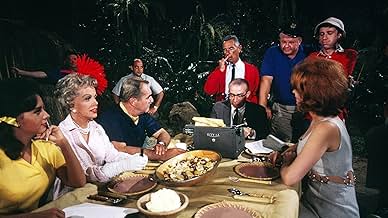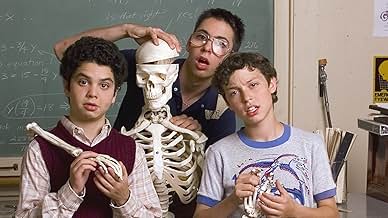Reunindo o público com os personagens de televisão com os quais cresceram enquanto introduzem comédias que certamente serão assistidas compulsivamente.Reunindo o público com os personagens de televisão com os quais cresceram enquanto introduzem comédias que certamente serão assistidas compulsivamente.Reunindo o público com os personagens de televisão com os quais cresceram enquanto introduzem comédias que certamente serão assistidas compulsivamente.
- Prêmios
- 1 indicação no total
Explorar episódios
Avaliações em destaque
What should have been a fun and light hearted look back, with minimal social commentary sadly turned into a cringeworthy and often irrelevant , inaccurate over analysis that took all the air out of the balloon.
Rather too many people attempting to apply their on rather faulty and false social ethics to history that often simply made comedy for what it as, something to laugh at and with.
Many of these people had little or no direct involvement in the actual comedy creation process.
It seems as if CNN management sat round a table with a white board full of all the latest terms and words that had to be included in order to fulfil some false sense of diversity and wokeness.
But in the end, it delivered too much that made the viewer roll eyes, tut and sigh.
I tried so hard to look past the faux commentary and.enjoy reliving some moments from my past but the final straw came when Margaret Cho spoke of cultural appropriation and misogyny, not having a clue what each actually means and with such an airy tone that looked down upon the audience.
It is so ironic that what should be a celebration of comedy was too often used as an excuse to over analyse, make wholly subjective assumptions, presented as fact and completely forget the whole point of the exercise.
One of the frequent contributors was the editor in chief of the A. V. Club, that has a tagline 'Pop culture obsessives writing for the pop culture obsessed'.
Obsessed is correct but sadly, all the obsession has clouded the brain so much that the neurons cannot be seen for the grey matter.
Rather too many people attempting to apply their on rather faulty and false social ethics to history that often simply made comedy for what it as, something to laugh at and with.
Many of these people had little or no direct involvement in the actual comedy creation process.
It seems as if CNN management sat round a table with a white board full of all the latest terms and words that had to be included in order to fulfil some false sense of diversity and wokeness.
But in the end, it delivered too much that made the viewer roll eyes, tut and sigh.
I tried so hard to look past the faux commentary and.enjoy reliving some moments from my past but the final straw came when Margaret Cho spoke of cultural appropriation and misogyny, not having a clue what each actually means and with such an airy tone that looked down upon the audience.
It is so ironic that what should be a celebration of comedy was too often used as an excuse to over analyse, make wholly subjective assumptions, presented as fact and completely forget the whole point of the exercise.
One of the frequent contributors was the editor in chief of the A. V. Club, that has a tagline 'Pop culture obsessives writing for the pop culture obsessed'.
Obsessed is correct but sadly, all the obsession has clouded the brain so much that the neurons cannot be seen for the grey matter.
How do you do a show on the history of sitcoms and omit the longest running sitcom in TV history!?! It is part of pop culture and a family sitcom yet it was completely omitted from the first episode. I'm just boggled and I really don't think that I missed it because I even rounded when it came time for the 19 8990s era especially when they talk about fox launching their network and they missed so many great fox shows and they only showed married with children. This series just lost so much credibility with me because I just don't know how one makes this mistake. Especially when Homer is like the anti-Dad, but they're such a family unit wild.
I'm enjoying these episodes. I grew up watching many of these sitcoms and like hearing from the actors and others in the business how they lived or viewed them. Yes they touch on topics that were affected during those years and you may or may not agree with it but that's their history.
I would love to see a really good history of the sitcom without all the same players. Of course they were vital , but this series brushes over the 50's and naturally spends most of its time on I Love Lucy. So many other shows that could be explored. They drag Norman Lear, Suzanne Somers, Eric McCormick out to expound and naturally we once again visit, Maude, Good Times, Modern Family ad nauseam.
The sitcom is a special art, a half hour format whose style comes from that 2/ minutes of entertainment.
Sex and the City, Fleabag, and others mentioned are not sitcoms. This ruined the whole premise of the show. So far, very bored.
The sitcom is a special art, a half hour format whose style comes from that 2/ minutes of entertainment.
Sex and the City, Fleabag, and others mentioned are not sitcoms. This ruined the whole premise of the show. So far, very bored.
I thought this was supposed to be the history of sitcom. Instead it is a sloppy, quick run through some popular and lesser known sitcoms. It's basically a short interview, less than a minute, then footage from the show. The retrospective on the show are brief and poorly explained.
Each episode starts in the 50s and ends in present day. Each episode also complains about minorities, women, and homosexuals not being on TV or if they were it was shown in a very stereotypical form. I do agree with this idea, literally every episode devolves into this. They should have make one episode in the shunning of aforementioned groups. I would guess 60-70% of this series is complaints about how minorities were treated.
It's amazing that they had such an enormous body of work to comment on and they come up with this. Its not the worst documentary I have seen but given the production value and money behind the documentary It's amazing they go for such boring low hanging fruit.
If you are looking for any kind.
Each episode starts in the 50s and ends in present day. Each episode also complains about minorities, women, and homosexuals not being on TV or if they were it was shown in a very stereotypical form. I do agree with this idea, literally every episode devolves into this. They should have make one episode in the shunning of aforementioned groups. I would guess 60-70% of this series is complaints about how minorities were treated.
It's amazing that they had such an enormous body of work to comment on and they come up with this. Its not the worst documentary I have seen but given the production value and money behind the documentary It's amazing they go for such boring low hanging fruit.
If you are looking for any kind.
Você sabia?
- ConexõesReferenced in Late Night with Seth Meyers: Amy Poehler/Joseph Gordon-Levitt/Kevin Smith (2021)
Principais escolhas
Faça login para avaliar e ver a lista de recomendações personalizadas
- How many seasons does History of the Sitcom have?Fornecido pela Alexa
Detalhes
- Data de lançamento
- País de origem
- Central de atendimento oficial
- Idioma
- Também conhecido como
- L'histoire des sitcoms
- Empresa de produção
- Consulte mais créditos da empresa na IMDbPro
Contribua para esta página
Sugerir uma alteração ou adicionar conteúdo ausente

































